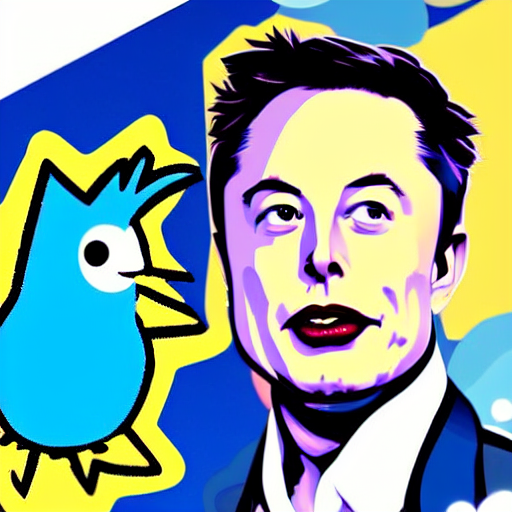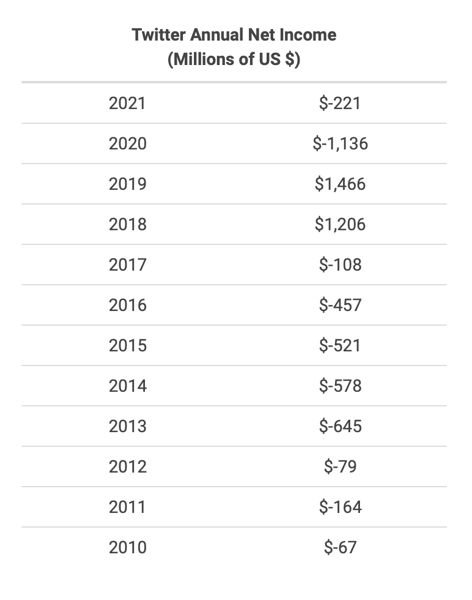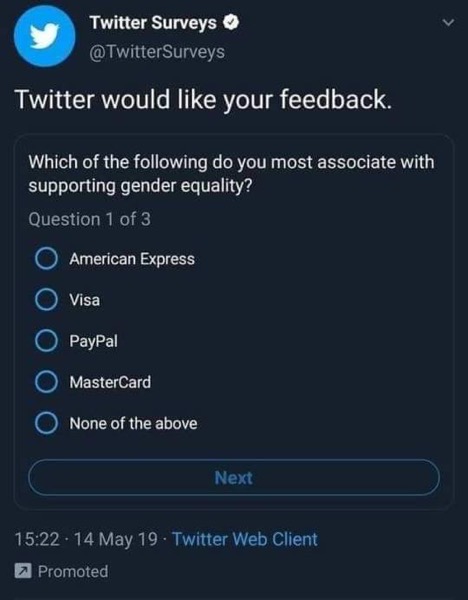
Apparently Elon Musk officially owns Twitter now.
Twitter’s easily my favorite social network. It’s always fit in with how my mind works (at least when I use it with clients like Tweetbot). I’ve often found community on Twitter, and Twitter is influential and consequential. Revolutions have taken place because of Twitter. Before news is news, it’s often on Twitter.
And now it belongs to rich dipshit Elon Musk. Though if it makes you feel better, he’ll probably become less rich because of this acquisition!
Twitter has been severely mismanaged for its entire existence. They famously procrastinated on a business model until finally settling on “I guess we should put ads in things.” In the early days people almost exclusively used Twitter via mobile apps made by third parties, but then Twitter got increasingly developer hostile and pushed third party apps away, presumably to help make it easier to put ads in things (though they are coming back around lately to third party Twitter experiences). They’ve gotten more and more bloated as a company, and they’ve struggled to articulate a stance on content moderation, though in reality it’s played out as being uncomfortably permissive toward Nazi types.
Twitter’s Future: The Icanthascheezburger Three-Point Plan
Elon’s got his work cut out for him (which is unfortunate given how many CEO jobs he juggles). Even though I really don’t care for him, I do care about Twitter, so the consulting wing of Icanthascheezburger is laying out this simple three-point plan:
Improve the Financials
Twitter bleeds money. They have only turned a profit in two of the last ten years. Musk is quite wealthy on paper but actually isn’t particularly cash-rich and probably will want to get Twitter in the black in the next year or two.

And he’s hinted as much; he’s talked a big game about firing as much as 75% of staff, and that’s probably coming from a feeling of sticker shock, but also for Twitter’s size, 4600 employees is a lot and it would make sense to learn the ins and outs of the company and strip down to the bare essentials, then build from there. The strategy worked pretty well for Steve Jobs when he took over Apple. Of course, Steve Jobs was smart enough not to run his mouth with some estimated number of jobs he planned to cut before he even took the wheel.
And as of press time, it seems Musk isn’t troubling himself to learn what teams are doing before firing them wholesale.
Admit What Twitter Is and What It’s Good At
To boil Twitter down to its purest essence would be to describe it as a relatively small, relatively unstructured microblogging platform, where people build up their communities by hand-picking the people they want to follow. It’s a place for information junkies because the content is so concise that it’s almost a stream of consciousness. It’s deeply candid and honest.
And Twitter has spent most of its post-IPO years doing its very best to resist that.

I don’t blame them; Twitter’s not a mass market product like Facebook, or most mass media. That’s why so many news sites take a single tweet and turn it into a 500-word article. Twitter is opinionated in how it works, and it caters to those information junkies who want the raw discourse injected right into their veins. Information travels around Twitter before it becomes news. It’s a primary source where you get the word directly from important people, not filtered through a PR person.
This Twitter is extremely valuable (and I think Musk correctly understands that), but it’s not valuable in the sense that Facebook got valuable. Twitter is a tool of massive cultural importance and consequence, but it’s not a network that will have billions of ad revenue-generating users, and for it to become that it would have to become something fundamentally different.
Twitter needs to do what Apple did post-Jobs returning, and what Crocs did a few years back: go back to basics and focus on what it’s best at.
But unlike Apple and Crocs, Twitter has to reckon with the issue that core Twitter was never a financial success, and that has to be solved for. I firmly believe it’s a solvable problem; the world clearly wants a thing like Twitter to exist.
Some ideas for how to accomplish this:
- Make some staffing cuts, ideally without being a huge dick about it (show gratitude, explain the strategy of righting the ship, and give the departed good severance to show goodwill and ensure you can recruit new people)
- Investigate how to simplify Twitter from a technical perspective so that it can be maintained with fewer engineers and less infrastructure (rumor has it that Twitter is inefficient in both team size and amount of infrastructure it runs to keep Twitter afloat)
- Make Twitter apps feel more fast and lightweight, and easier to navigate
- Invest heavily in Twitter Blue (the paid Twitter experience). I would set a goal to make 10–20% of Twitter’s users paid users, and price it so that paid users’ revenue was enough to keep everything running. Make the features in Twitter Blue super compelling and worth forking over money for. Make Twitter Blue an ad-free experience which is literally the biggest feature people ask for. Add power user features.
- Monetize Twitter’s API, either charging developers to use it, or having third party apps that end users use also get advertising (for non-paid users). It’ll incentivize Twitter to keep investing in the API, and as the API gets better that will incentivize developers to make more cool new things on Twitter’s platform
- As a corollary to monetizing the API, do revenue sharing with developers making Twitter apps for users. If you make a 3rd party Twitter client, serve up ads from Twitter and get a cut of that ad revenue, or a cut of the Twitter Blue subscription revenue. This will incentivize more great apps and add more Twitter users.
- Make more features available through the API. Twitter power users are often using third party clients, and it’s good to give them access to new features.
- Fix community management and content moderation. It stunts your growth if nobody feels welcome joining Twitter because you were tripping over yourself trying to make sure that assholes and Nazis feel welcome. There isn’t an anti-conservative bias on social networks (if you actually measure it, it’s the opposite). Hire lots of smart humans, build good tools for those humans to work well, and give the humans good, sound policies to enforce.
Build on Initial Success Once It’s Achieved
Twitter’s been trying to build out a bunch of new stuff over the past couple of years in the hopes that one of them will have traction and catch on and presumably make Twitter money. The problem is that new products like Twitter Spaces are the kind of thing you make when you have a successful and profitable core product and you want to expand. Twitter hasn’t yet made its core product profitable.
Musk has hinted that he wants to turn Twitter into an “everything app” like WeChat. That’s a dumb idea. Now, I get why a rich dude might salivate at the idea of making a super monopolistic piece of software that everything else is built on top of and dependent on, but WeChat really only took hold in China because, well, it’s China. Facebook tried doing it with Messenger awhile back and it kind of fizzled out.
But once Twitter finds financial success, then it’s a good time to start experimenting with totally new things. Hopefully these are things that actually build on Twitter’s core, not shitty attempts to make a copy of another social network that’s currently growing.
I can’t really predict what these things might be; Twitter has to figure this shit out for themselves. But the new features need to be Twittery.
I can’t quite define what I mean here, but I’m thinking of things that are lightweight, fast, and concise. They’re things that embrace the open web (like how tweets are accessible via public URLs, making them easy to link to and find and otherwise interact with). Good Twitter features add frictionlessnes to things, like how hashtags made it super easy to quickly jump into public conversations about things, or how quote tweets made it super easy to add some extra perspective to someone else’s thought (or mercilessly roast them). Veer too far from that, and you’re fundamentally making a different product. And it wouldn’t be bad to do that, but don’t do it under the Twitter moniker; spin up a totally new brand and app name, and experiment there.
What About the Rest Of Us?
Yeah, so I really didn’t mean to write this post as an unsolicited advice column for Elon Musk; I just couldn’t help but dig into and enumerate Twitter’s many misgivings.
But what are we to do?
I have severely mixed feelings. I think Twitter was getting short shrift on the public market and theoretically benefits from being private, but I have serious doubts about Elon Musk’s ability to run this company well (and given that Twitter engineers were told yesterday to print out all of their code for Tesla engineers to come review, it’s confirming my suspicions that Musk likes to act before thinking).
But for now, I plan to stick around, assuming nothing super disruptive happens to the way I experience Twitter. I use Tweetbot to scroll through Twitter, and it’s been solidly consistent, always showing me a chronological feed of tweets from exactly the people I follow and no one else. Twitter is special; it’s the only place where I can follow all these specific people I care about following and see what they have to say.
But it’s really important to me to keep investing in communities that use truly open tools.
This blog is itself one such thing; it’s built on the open web and it’s totally under my control. It’s not really much of a community, though.
I’m on micro.blog, though I’m not that active on there. I’m on Mastodon too, though I’m not that active on there either. I am an ardent RSS user and I follow a ton of blogs, most of which are independent. But I would like to see more people who are less tech-oriented to be making blogs again. And I love the open web because it’s easy to me to make my own little media bubble of exactly the things I care about, free of the bullshit of modern sites.
The problem with apps like Mastodon and Micro.blog (and others like Diaspora and countless other sites that sprung up) is that although they can be drop-in replacements for Twitter from a tech perspective (in the sense that they are apps for short-form microblogging on the web), Twitter isn’t its apps and APIs. The heart and soul of Twitter is the community, and it would be nigh impossible for me to get everyone I follow to move to one of these other sites. It would take a mass migration of some sort, which I don’t see happening unless Twitter really fucks shit up (which they totally could!).
Jack Dorsey has talked about making Twitter a protocol that Twitter is itself a member of, which would be really cool if it actually happened. That would mean I could move to apps run by people who aren’t Twitter while still being able to connect to people on Twitter, and it would be simpler to convince people to migrate off Twitter since they wouldn’t have to lose touch with followers or followees. I’d love to see this, and I actually feel like it’s more possible now than ever before now that Twitter is under private ownership, but I struggle to see how Twitter finds financial success in a world where Twitter is one network of many that are just like it and interoperable with it.
But despite what paperwork may say, Twitter still belongs to the masses, and because Twitter’s financial value hinges on the masses continuing to show up and participate, I don’t feel hopeless.
Leave a Reply